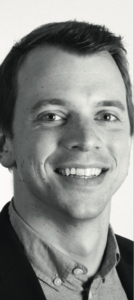
02 Jan ‘Employees help decide on investments and HR’ – HRmagazine (Jan ’22)
“The more autonomously employees make decisions, the more engaged they are and the more ownership they feel of the company”
 Radical transparency and a participative collaboration model where employees decide on investments and recruitment is the hr strategy of Thijs Claes, ceo of printing company Daddy Kate. “That creates commitment.”
Radical transparency and a participative collaboration model where employees decide on investments and recruitment is the hr strategy of Thijs Claes, ceo of printing company Daddy Kate. “That creates commitment.”
Daddy Kate was founded in 1978 by father Claes, who grew the printing company into a thriving business. His son Thijs Claes came on board in 2009 and became ceo in 2013. He is a supporter of the participatory collaboration model, inspired by Brazilian businessman Ricardo Semler, for whom engaged employees are the foundation of any successful business. “When I read his book, I had an aha-erlebnis,” says Thijs Claes. “Semler also belongs to the second generation and thoroughly reshaped his father’s company. He did what I subconsciously thought, but could not put into words properly. His principles are easy to apply because you distance yourself from certain structures, processes and flows that do not lead to efficiency anyway. The big step in this is transparency. If you are transparent about everything, you no longer have to maintain many processes because everyone is in the know. That way, you lose less time on political games, which demand a lot of energy from the organisation.”
TRANSPARENCY
Every month, Thijs Claes makes a 15-minute video on the results and shares it with all employees. “This way they know how the company is doing financially, which important customers have come or gone. By sharing that information, employees are more engaged and wonder why the previous month was good or bad. At the end of the year, we share 20% of our profits equally among all employees.”
In addition to the results, the company also shares minutes of all meetings. This is done via Speakap, a kind of internal Facebook. “Sometimes this transparency is hard and direct, but we have no secrets from each other.”
Employees not only share in the profits, but are also involved in important investments and decisions. “Everything we do should ensure that we are a stronger company than we were yesterday. The more autonomously employees take decisions, the more involved they are and the more ownership they feel of the company. This makes the company stronger and ensures our long-term vision. That is our main driver: that the company becomes stronger, preserves its individuality and thus continues to exist.”
Concrete examples of that participatory collaboration model abound. When the company wanted to invest in a new machine, the whole team was involved in the purchase process. “In many companies, the ceo, the purchasing manager and an expert go on site to tie the knot. We want the employees to get behind the investments so that the machines can achieve their full potential. So we went to the Netherlands with 12 employees to see if it was a suitable machine.”
RECRUITMENT BY EMPLOYEES
But employees’ opinions are also sought in recruitment. That crucial step – asking employees what they think – many organisation skip, thinks Thijs Claes. “If we lack flexibility or notice that employees are working a lot of overtime, we suggest from management to hire someone extra,” he says. “We have already been surprised that employees are rather reluctant to hire new colleagues. This is because the bar is high and it is not easy to find employees who meet their standard. They often hold their ground until the moment it is no longer feasible and they realize that someone needs to be added. But then you also know you have everyone’s commitment.”
The management guides the process and draws up the vacancy with the employees by asking questions about the new colleague’s position, their language skills, technical abilities or experience. “We go over the candidates and decide together who will come for an interview. If the first interview was positive, we discuss how we will test the candidates: on technical knowledge, stress resistance or usually a combination of both. Finally, we go over whether the person is suitable. We also guide this process because the standard answer is often no. Then we explain that we are not fishing in a big pond and therefore sometimes have to adjust expectations. But we do not take a decision that the employees do not support. If one person says no with a convincing argument, we do not recruit that person. Basically, everyone has veto power.”
NO INTERFERENCE FROM ABOVE

Daddy Kate is divided into 12 teams with which Thijs Claes regularly dares to experiment. “We try to take every decision as low down in the organisation as possible, but we are not going to apply certain rules or principles to all teams immediately. Some teams are more advanced than others, for example because employees have been working here for twenty years and know the organisation better than younger teams. And some employees are simply more mature than others.”
“For example, we have teams that arrange their holidays themselves without interference from above, while other teams indicate that they are not yet ready for this and cannot work it out together. Many companies make the mistake of wanting to push a certain philosophy throughout the company. It is better to let it grow gradually. If an experiment is successful, we gradually copy it in the other teams. Sometimes they also nudge each other to be more self-managing or have more ownership of certain decisions.”
Already a successful experiment was appointing management from the bottom up. “Our employees themselves decide who becomes team leader and who can represent them in the management team,” explains Thijs Claes. “In many companies, the ceo decides this, but we reversed that a few years ago, albeit starting from the existing structure. That way you get a totally different dynamic. This brings out employees you wouldn’t expect at all in a classic management team. On an individual level, we may be less strong because we don’t look for higher profiles, but collectively we are much stronger. Very recently, we found that the step to team leader is too big for some people, especially among our workers. That is why we are now experimenting with a ‘captain’ in some teams. By analogy with sport, this person is an extension of the coach/team leader, but is also on the field. We are already curious to see how this will evolve further.”
Getting the teams to work together even more is one of the focal points. That is why Daddy Kate organises at least four meetings a year where everyone is obliged to listen to each other, talk about the operation and tell in which areas things are not going well. “We use that moment to think about how to fix the problem. Again, we ask the question: what is the best way for you to tackle this? In the beginning, team delegates tended to defend their own team, but after a few meetings they increasingly realise that they have to solve it together.”
Source: https://hrmagazine.be/nl/operations/medewerkers-beslissen-mee-over-investeringen-en-hr




Sorry, the comment form is closed at this time.